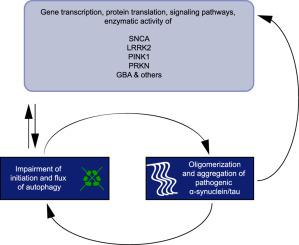当前位置:
X-MOL 学术
›
J. Mol. Biol.
›
论文详情
Our official English website, www.x-mol.net, welcomes your
feedback! (Note: you will need to create a separate account there.)
Autophagy in Parkinson's Disease.
Journal of Molecular Biology ( IF 4.7 ) Pub Date : 2020-02-13 , DOI: 10.1016/j.jmb.2020.01.037 Xu Hou 1 , Jens O Watzlawik 1 , Fabienne C Fiesel 1 , Wolfdieter Springer 2
Journal of Molecular Biology ( IF 4.7 ) Pub Date : 2020-02-13 , DOI: 10.1016/j.jmb.2020.01.037 Xu Hou 1 , Jens O Watzlawik 1 , Fabienne C Fiesel 1 , Wolfdieter Springer 2
Affiliation

|
Impaired protein homeostasis and accumulation of damaged or abnormally modified protein are common disease mechanisms in many neurodegenerative disorders, including Parkinson's disease (PD). As one of the major degradation pathways, autophagy plays a pivotal role in maintaining effective turnover of proteins and damaged organelles in cells. Several decades of research efforts led to insights into the potential contribution of impaired autophagy machinery to α-synuclein accumulation and the degeneration of dopaminergic neurons, two major features of PD pathology. In this review, we summarize recent pathological, genetic, and mechanistic findings that link defective autophagy with PD pathogenesis in human patients, animals, and cellular models and discuss current challenges in the field.
中文翻译:

帕金森病中的自噬。
蛋白质稳态受损以及受损或异常修饰蛋白质的积累是许多神经退行性疾病(包括帕金森病 (PD))的常见疾病机制。作为主要的降解途径之一,自噬在维持细胞内蛋白质和受损细胞器的有效周转方面发挥着关键作用。经过数十年的研究工作,人们深入了解了自噬机制受损对 α-突触核蛋白积累和多巴胺能神经元变性(PD 病理学的两个主要特征)的潜在贡献。在这篇综述中,我们总结了最近在人类患者、动物和细胞模型中将缺陷自噬与 PD 发病机制联系起来的病理、遗传和机制发现,并讨论了该领域当前的挑战。
更新日期:2020-02-13
中文翻译:

帕金森病中的自噬。
蛋白质稳态受损以及受损或异常修饰蛋白质的积累是许多神经退行性疾病(包括帕金森病 (PD))的常见疾病机制。作为主要的降解途径之一,自噬在维持细胞内蛋白质和受损细胞器的有效周转方面发挥着关键作用。经过数十年的研究工作,人们深入了解了自噬机制受损对 α-突触核蛋白积累和多巴胺能神经元变性(PD 病理学的两个主要特征)的潜在贡献。在这篇综述中,我们总结了最近在人类患者、动物和细胞模型中将缺陷自噬与 PD 发病机制联系起来的病理、遗传和机制发现,并讨论了该领域当前的挑战。































 京公网安备 11010802027423号
京公网安备 11010802027423号